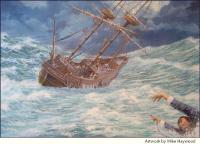M, #1788, b. circa 1599, d. 23 February 1672
| Father* | Henry Howland1 |
| Mother* | Margaret (?)1 |
Reference=004474
Last Edited=4 Sep 2017
John Howland was born either abt. 1592 or abt. 1599 in Fenstanton, Huntingdonshire, England.1,2 He was the son of Henry Howland and Margaret (?)1 He was an indentured servant of John Carver and sailed aboard the Mayflower with the Carver family in 1620 to Plymouth Colony.1,2 An incident during the voyage nearly cost Howland his life. As William Bradford recorded: "In sundry of these storms, the winds were so fierce and the seas so high, as they could not bear a know of sail, but were forced to hull for divers days together. And in one of them, as they thus lay at hull in a mighty storm, a lusty young man called John Howland, coming upon some occasion above the gratings was with a seele of the ship, thrown into the sea; but it pleased God that he caught hold of the topsaid halyards which hung overboard and ran out at length. Yet he held his hold (though he was sundry fathoms under water) till he was hauled up by the same rope to the brim of the water, and then with a boat hook and other means got into the shop again and his life saved. And though he was something ill with it, yet he lived many years after and became a profitable member both in church and commonwealth."
On Nov. 11, 1620, John Howland was the thirteenth man to sign the Mayflower Compact. After the death of John Carver and his wife in the spring of 1621, Howland inherited his estate and the care of those left in the household, Elizabeth Tilley, Desire Minter, and William Latham.1,3,2 He married Elizabeth Tilley, daughter of John Tilley and Joan Hurst Rogers, on 25 March 1623 in Plymouth Colony.1 According to Elizabeth Pearson White, "In 1626 John Howland became one the forty-two colonists who assumed Plyouth Colony's debt of [1800 pounds] owed to the Merchant Adventurers of London. In order to pay off this mortgage, a monopoly in the Colony's trade was granted to William Bradford, Isaac Allerton and Myles Standish, who chose John Howland as one of their partners, or undertakers, in the project. Later they established a trading post far to the northward, on the Kennebec River, at the present site of Augusta, Maine. John was put in charge of the trading post and a brisk trade developed there in beaver, otter and other furs gathered by the Indians. John's family may have spent some time with him in Maine, and some of his children may have been born there." But in "The Great Migration Begins," Robert Charles Anderson states that in terms of some of his children being born in Maine, "Robert S. Wakefield has gathered the evidence that this could not have been the case."1,4 He died on 23 February 1672 in Rocky Nook, Massachusetts.1,2
On Nov. 11, 1620, John Howland was the thirteenth man to sign the Mayflower Compact. After the death of John Carver and his wife in the spring of 1621, Howland inherited his estate and the care of those left in the household, Elizabeth Tilley, Desire Minter, and William Latham.1,3,2 He married Elizabeth Tilley, daughter of John Tilley and Joan Hurst Rogers, on 25 March 1623 in Plymouth Colony.1 According to Elizabeth Pearson White, "In 1626 John Howland became one the forty-two colonists who assumed Plyouth Colony's debt of [1800 pounds] owed to the Merchant Adventurers of London. In order to pay off this mortgage, a monopoly in the Colony's trade was granted to William Bradford, Isaac Allerton and Myles Standish, who chose John Howland as one of their partners, or undertakers, in the project. Later they established a trading post far to the northward, on the Kennebec River, at the present site of Augusta, Maine. John was put in charge of the trading post and a brisk trade developed there in beaver, otter and other furs gathered by the Indians. John's family may have spent some time with him in Maine, and some of his children may have been born there." But in "The Great Migration Begins," Robert Charles Anderson states that in terms of some of his children being born in Maine, "Robert S. Wakefield has gathered the evidence that this could not have been the case."1,4 He died on 23 February 1672 in Rocky Nook, Massachusetts.1,2
Family: Elizabeth Tilley b. 30 Aug 1607, d. 21 Dec 1687
- Desire Howland+1 b. c 1625, d. 13 Oct 1683
- John Howland1 b. 24 Apr 1627
- Hope Howland1 b. 30 Aug 1629
- Elizabeth Howland1 b. c 1631
- Lydia Howland1 b. c 1633
- Hannah Howland1 b. c 1637
- Joseph Howland1 b. c 1640
- Jabez Howland1 b. c 1644
- Ruth Howland1 b. c 1646
- Isaac Howland1 b. 15 Nov 1649
Citations
- [S406] Elizabeth Pearson White, John Howland of the Mayflower, Volume 1: The First Five Generations: Documented Descendants Through his First Child Desire Howland and her Husaband Captain John Gorham (Camden, Maine: Picton Press, 1990). Hereinafter cited as John Howland of the Mayflower.
- [S429] Caleb H. Johnson, The Mayflower and Her Passengers (Indiana: Xlibris Corp., 2006). Hereinafter cited as Mayflower and Her Passengers.
- [S432] William Bradford, History of Plymouth Plantation by William Bradford, the second Governor of Plymouth (Boston: n.pub., 1856). Hereinafter cited as History of Plymouth Plantation.
- [S77] Robert Charles Anderson, The Great Migration Begins: Immigrants to New England, 1620-1633, Volumes 1-3 (Boston: New England Historical and Genealogical Society, 1996-2011), John Howland entry. Hereinafter cited as Great Migration Begins.
